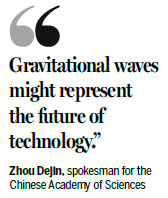Researchers hope to catch next big wave
Updated: 2016-02-17 08:21
By Cheng Yingqi(China Daily)
|
||||||||
China missed the chance to become part of the global observatory network that recently reported the first direct observation of gravitational waves, experts said, adding that space exploration is an opportunity that cannot be overlooked.
"When US scientists planned a global network to expand LIGO's (the advanced Laser Interferometer Gravitational-wave Observatory) surveillance area, they had proposed the idea of an observatory to Beijing," said Hu Wenrui, a renowned physicist and a member of the Chinese Academy of Sciences.
"However, the Chinese did not accept the idea for building a ground detector, so LIGO chose its Asian base in India," he said.
NowLIGO has two interferometer facilities in the United States and is also cooperating with the UK, Germany, Australia, India and other countries to form a global gravitational wave detector network.
"LIGO was built in 1999 but literally found nothing," said Hu.
In 2011, scientists improved LIGO's design and the National Science Foundation in the US granted another $400 million.
"This was very farsighted," Hu said.
The advanced LIGO project was finished on March 31, and received signals of the longs ought gravitational wave six months later.

"China started research for building our own gravitational wave facilities in 2008, but it was very, very difficult to promote the project because gravitational waves are some thing so far from people's daily lives that few knew its significance," Hu said.
"I hope the success of LIGO will bring gravitational wave research to the forefront," he said.
Now scientists from the Chinese Academy of Sciences are proposing a space research project to catch up with countries that have looked into this field for decades.
"We have to participate in the research, because gravitational waves might represent the future of technology," said Zhou Dejin, spokesman for the academy.
Zhou cited the case of electromagnetic waves, which were considered too advanced to be of practical use when predicted in the late 19th century, but today we are using them in every aspect of communication including radio, TV, Internet and GPS.
"The discovery of gravitational waves is comparable to that of electromagnetic waves, and space exploration will give us vast potential for future development in the field," said Wu Yueliang, vice-president of the University of the Chinese Academy of Sciences.
Wang Yifang, head of the CAS high-energy physics institute, said that China should consider big scientific programs.
"Major scientific discoveries cannot be made overnight. Ifwe do not plan for today, we won't have any significant output tomorrow," he said.
chengyingqi@chinadaily.com.cn
(China Daily 02/17/2016 page4)
- Paid menstrual leave provokes controversy in China
- MIT establishes supply chain education center in China
- One of the two dead sperm whales in East China salvaged
- 20,000 yuan eaten by ants gives artist a frame for inspiration
- Chinese military sets up corruption hotline
- Foreigners working in Beijing can now buy apartments immediately
- 'Grim Sleeper' murder trial begins six years after arrest
- Cameron defends EU deal as lawmakers offer no guarantees
- Sarkozy placed under investigation in campaign funding probe
- Moscow dismisses accusation of Russia bombing Syrian hospitals
- 2016 Westminster Kennel Club Dog Show held in New York
- Pakistan confirms participation in Saudi-led military drills

 One of the two dead sperm whales in East China salvaged
One of the two dead sperm whales in East China salvaged
 Armless student pursues painting dream
Armless student pursues painting dream
 62-year-old folk artist carries on firecracker dragon lantern
62-year-old folk artist carries on firecracker dragon lantern
 Bridge expert's former home converted to restaurant
Bridge expert's former home converted to restaurant
 Excitement, charm and grace: Chinese New Year in UK
Excitement, charm and grace: Chinese New Year in UK
 Taylor Swift wins Album of the Year at Grammys
Taylor Swift wins Album of the Year at Grammys
 Stars spotted at film academy exam in China
Stars spotted at film academy exam in China
 Record number of Chinese travel abroad for Spring Festival
Record number of Chinese travel abroad for Spring Festival
Most Viewed
Editor's Picks

|

|

|

|

|

|
Today's Top News
Will US-ASEAN meeting be good for region?
Accentuate the positive in Sino-US relations
Dangerous games on peninsula will have no winner
National Art Museum showing 400 puppets in new exhibition
Finest Chinese porcelains expected to fetch over $28 million
Monkey portraits by Chinese ink painting masters
Beijing's movie fans in for new experience
Obama to deliver final State of the Union speech
US Weekly

|

|







